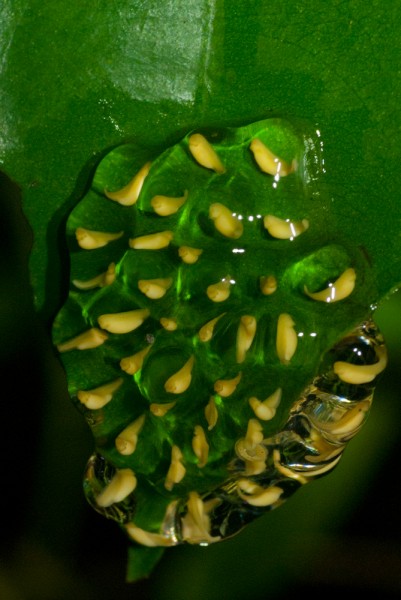
Frogs that are adapting to climate change by laying eggs both in water and on land may be better equipped to handle changing weather patterns. (Photo courtesy of STRI)
Most of the more than 6,000 species of frogs in the world lay their eggs in water. But many tropical frogs lay their eggs out of water. This behavior protects the eggs from aquatic predators, such as fish and tadpoles, but also increases their risk of drying out. Justin Touchon, post-doctoral fellow at the Smithsonian Tropical Research Institute, discovered that climate change in Panama may be altering frogs’ course of evolution.
By analyzing long-term rainfall data collected by the Panama Canal Authority, Touchon discovered that rainfall patterns are changing, just as climate change models predict.
“Over the past four decades, rainfall has become more sporadic during the wet season,” said Touchon. “The number of rainy days decreased and the number of gaps between storms increased.”
The eggs of the pantless treefrog, Dendropsophus ebraccatus, are extremely susceptible to drying. The embryos die within a day when there is no rain. Heavy rains trigger breeding, so as storms become sporadic, the chance of rain within a day of being laid decrease, and so does egg survival.
As weather patterns have changed, the advantage of laying eggs out of water has decreased, not only for pantless treefrogs but potentially for many species. “Pantless treefrogs can switch between laying eggs in water or on leaves, so they may weather the changes we are seeing in rainfall better than other species that have lost the ability to lay eggs in water,” said Touchon. “Being flexible in where they put their eggs gives them more options, and allows them to make decisions in a given habitat, which will increase the survival of their offspring.”
The Smithsonian Tropical Research Institute, headquartered in Panama City, Panama, is a unit of the Smithsonian Institution. The Institute furthers the understanding of tropical nature and its importance to human welfare, trains students to conduct research in the tropics and promotes conservation by increasing public awareness of the beauty and importance of tropical ecosystems. Website: www.stri.si.edu.
—Beth King, Smithsonian Tropical Research Institute
